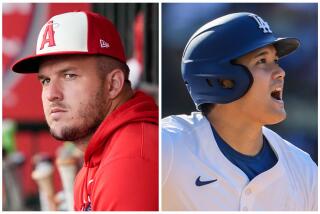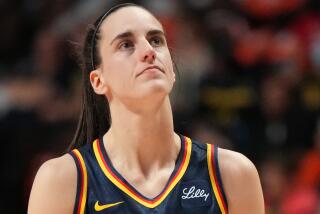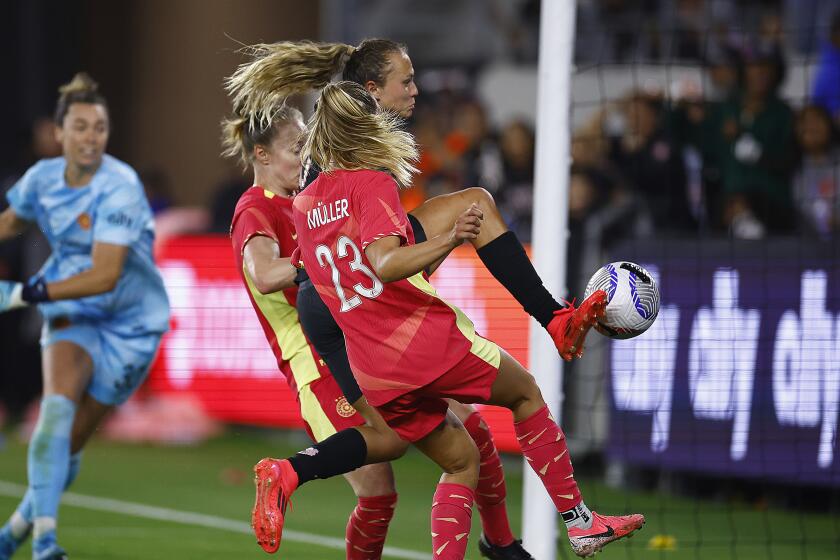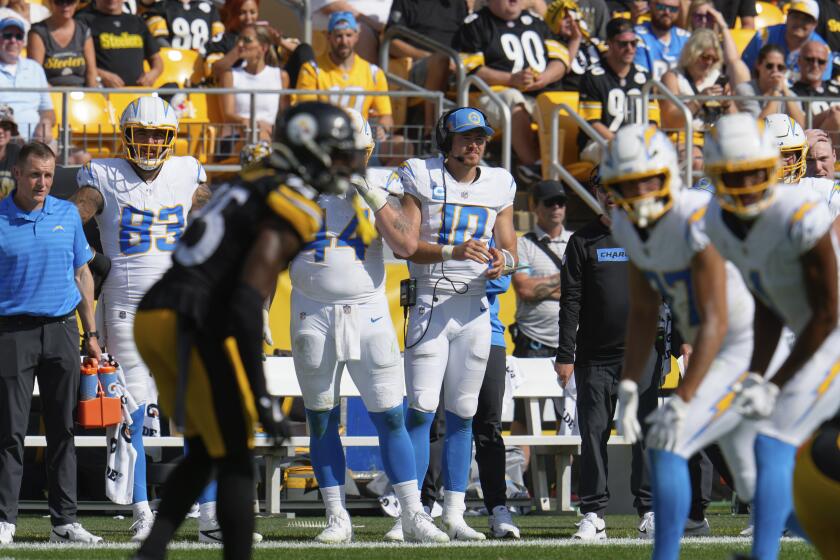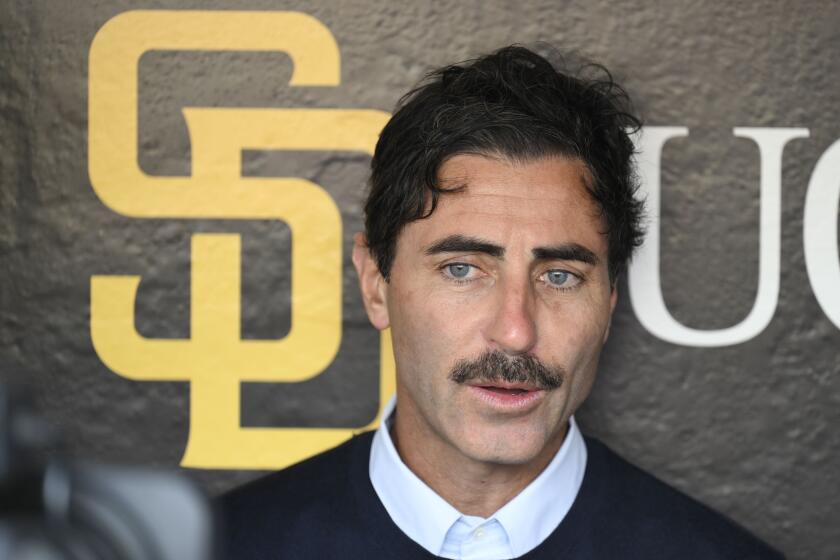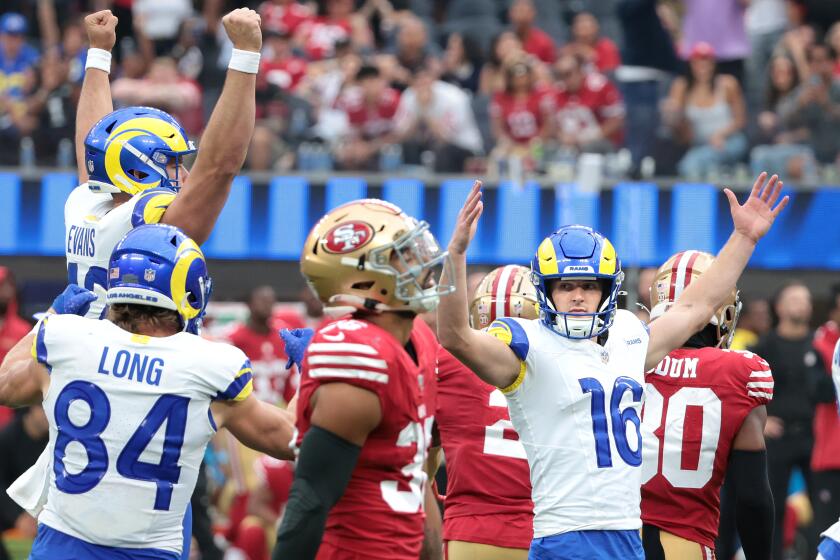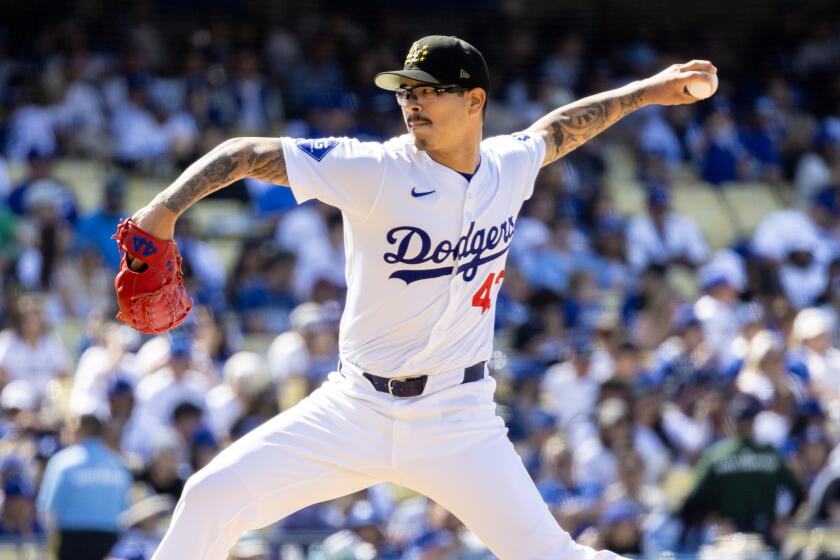SPIRAL-BOUND
For all the hype, grandeur and corporate extravagance of the Super Bowl, this year’s version of the nation’s most-watched sports event boils down to two little names.
Tom versus Eli.
It’s only fitting that the NFL, a league so predicated on passing, is showcasing two of its greatest quarterbacks in New England’s Tom Brady and the New York Giants’ Eli Manning.
Never has the importance of that cornerstone position been more evident than this season.
And no city is more acutely aware of that than Indianapolis, the host of Super Bowl XLVI, whose Colts were decimated this season by the neck surgeries that sidelined Peyton Manning, the league’s only four-time most valuable player.
Without him, the Colts -- among the most successful franchises of the 2000s, in any sport -- were a husk of their former selves, finishing 2-14 then cleaning house, sending coach Jim Caldwell and Hall of Fame-worthy team president Bill Polian packing.
Startling and abrupt as that collapse was, it only underscored the disproportionate importance of the most glorified -- and scrutinized -- position in team sports.
If you have a Brady or a Manning type, you’ll be in the Super Bowl hunt almost every year. If you don’t, you probably won’t.
“The teams that have one are still playing in January,” said former NFL quarterback Rich Gannon, the league’s MVP in 2002. “The teams that don’t have one are searching for them.
“The teams that don’t have them are replacing their coaches.”
Without question, there are positions in other team sports that play an essential role in a team’s success -- a point guard in basketball, a goaltender in hockey, an ace starting pitcher in baseball -- but whose thumbprint on a franchise’s fortunes is more evident than that of a quarterback?
Consider this: Of the 15 coaches inducted into the Pro Football Hall of Fame since World War II, all but four had quarterbacks who also have busts in Canton, Ohio -- among them Don Shula, who coached three Hall of Famers in John Unitas, Bob Griese and Dan Marino, and Bill Walsh, who coached Joe Montana and handed Steve Young off to George Seifert.
“A great coach is going to need great players, and certainly the key one is quarterback,” said former Buffalo coach Marv Levy, who is in the Hall of Fame along with his quarterback, Jim Kelly. “You hope that the coaches played some hand in developing a guy into an outstanding quarterback.”
Young thinks there is no other position in sports that “dictates the terms” of a game the way quarterback does, whether that impact is positive or negative.
“Everybody feeds off of what the quarterback can and cannot do,” he said. “Defensively, offensively, everybody reacts to what threats or non-threats the quarterback has. Everything else is secondary.
“The foundation of the game is really built off of responding to what the quarterback presents. That’s why it’s so scrutinized. That’s why when somebody dictates terms like Tom Brady or Drew Brees or Aaron Rodgers, or now Eli Manning, it’s almost indefensible at some times.
“You think about defensive mind-sets. Every week is the same thing: Can we knock him down? So you know that everyone on that side of the ball has one thing in mind, and that’s to screw you up. It’s their focus.”
Former baseball player Todd Zeile, who spent 16 years as a third baseman, first baseman and catcher with 12 major league clubs, said an argument can be made that quarterback is the most influential position in team sports, considering he touches the ball on virtually every offensive play of a far shorter season than baseball, basketball or hockey -- a season in which every game is vitally important.
“The only conclusion I would draw that’s different,” Zeile said, “is it’s hard to deny that a pitcher holding a baseball can dominate, especially in the National League. He could potentially throw a no-hitter and hit a home run, and nobody else on the field mattered. It’s hard for [a player in] any other sport to completely dominate a single game like a pitcher can.”
However, Zeile said: “The influence that a quarterback has stems from his ability to adapt to the environment, read the defense, see the different kinds of ways that they’re trying to adapt to him, and to be the eyes for that head coach that’s on the sidelines and knows the plays and formations but can’t see the game the way the quarterback does.”
Hockey great Wayne Gretzky said he has always appreciated the challenges quarterbacks face, but he gained even more of an appreciation watching his son play the position in high school.
“First of all, you’ve got to be as physically tough as anybody on the team, because each and every play there’s an opportunity for you to get pounded,” said Gretzky, whose son Trevor was a quarterback at Westlake Village Oaks Christian High. “Mentally, as a quarterback your focus has to be 100% -- you can’t afford to make any mistakes. One mistake could extremely change the outcome of a game, so it’s imperative that you’re physically and mentally prepared.”
NFL front offices need to be prepared and aware too. Picking the wrong quarterback can cost an organization financially and psychologically for years and years.
“Ownership can mess it up, so if you don’t have a good owner, you’re not going to be good year in and year out,” said Robert Kraft, owner of the Patriots. “But you need a good coach and a good quarterback. We talk about team, and it takes a lot of players, but if you don’t have a good quarterback, you’re not going to win consistently.”
In the 1998 draft, Polian was faced with a monumental and widely debated decision -- Peyton Manning or Ryan Leaf? The Colts became a perennial Super Bowl contender and won a championship with Eli’s older brother, while the Chargers were left in ruins by having to settle for Leaf, a problem child who was a disaster on and off the field.
Fifteen years earlier, in the league’s most celebrated and ultimately successful quarterback class, Marino was grabbed by Miami, after Todd Blackledge (Kansas City), Tony Eason (New England) and Ken O’Brien (New York Jets) had been selected. Marino led the Dolphins to a Super Bowl in his second season and is the only Hall of Famer in that group.
Just as the Green Bay Packers reaped the benefits of trading for Brett Favre and drafting Rodgers, the Raiders bore the brunt of taking Todd Marinovich and JaMarcus Russell, and the post-Boomer Esiason Cincinnati Bengals became a laughingstock with David Klingler and Akili Smith.
Worried about the condition of Brees’ surgically repaired throwing shoulder, the Dolphins passed on him in favor of Daunte Culpepper. The New Orleans Saints, champions for the first time in the 2009 season, are eternally grateful.
The Baltimore Ravens showed in 2000 that it’s possible to win a Super Bowl with a game manager at quarterback. Trent Dilfer wasn’t elite, but he didn’t make costly mistakes and was supported by a dominant defense.
No matter the passing statistics, Dilfer said it’s vital for a quarterback to have the trust and belief of his teammates.
“Because of the dialogue now in the NFL, the narrative is always, ‘You can’t win without a quarterback, quarterback is so important, quarterback-driven. . . .’
“When all the players hear is that, then they’d better believe in the person. And if they don’t believe, they’re going to be less. They’ve lost the battle before the battle’s started.”
The Denver Broncos’ unwavering belief in Tim Tebow -- a 46.5% passer -- unexpectedly helped propel them to the playoffs, where they upset Pittsburgh in the first round.
During Super Bowl week, the national media will be consumed with speculation about whether Peyton Manning’s neck issues will permit him to continue his Hall of Fame career.
Throughout the season, fans in several losing cities -- Jacksonville, Miami and Indianapolis among them -- openly lobbied for their teams to lose and thereby secure the first overall pick in the 2012 draft. The prize? Stanford’s Andrew Luck, the most coveted quarterback prospect since John Elway in 1983. Colts fans won the Luck sweepstakes.
If the Colts draft Luck, they probably will expect him to make the same kind of sudden impact that Cam Newton, the first overall pick in the 2011 draft, made on Carolina. Newton broke Peyton Manning’s record for passing yards by a rookie, set the league’s single-season mark for rushing touchdowns by a quarterback (14), and was the league’s offensive rookie of the year.
Quarterback will come sharply into focus this week too. Six of the last 10 Super Bowl MVPs were quarterbacks, including Brady (twice) and Eli Manning. Brady is bound for the Hall of Fame, and the younger Manning might be too.
“You may be able to win a championship with a great quarterback and a so-so coach,” said Gannon, an NFL analyst for CBS. “But I don’t know that you can win a championship with a great coach and a so-so quarterback.”
Giants defensive end Justin Tuck summed up his Super Bowl XLVI marching orders succinctly.
“It’s all about stopping the head dog,” he said. “And on offense, the head dog is the quarterback.”
twitter.com/latimesfarmer
--
(BEGIN TEXT OF INFOBOX)
PATRIOTS WITH TOM BRADY (2000-PRESENT)
5
Super Bowl appearances
3-1
Super Bowl record
9
Playoff appearances
16-5
Playoff record
PATRIOTS BEFORE TOM BRADY (1967-1999)
2
Super Bowl appearances
0-2
Super Bowl record
9
Playoff appearances
6-9
Playoff record
--
GIANTS WITH ELI MANNING (2004-PRESENT)
2
Super Bowl appearances
1-0
Super Bowl record
5
Playoff appearances
7-3
Playoff record
GIANTS BEFORE ELI MANNING (1967-2003)
3
Super Bowl appearances
2-1
Super Bowl record
10
Playoff appearances
12-8
Playoff record
More to Read
Go beyond the scoreboard
Get the latest on L.A.'s teams in the daily Sports Report newsletter.
You may occasionally receive promotional content from the Los Angeles Times.
